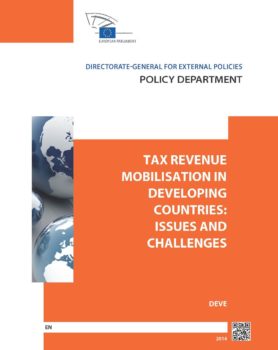In recent years, domestic revenue mobilisation in developing countries gained increasing prominence in the policy debate. Several factors explain this, including the potential benefits of taxation for statebuilding; independence from foreign aid; the fiscal effects of trade liberalisation; the financial and debt crisis in the “West”; and the acute financial needs of developing countries. Governments in developing countries face great challenges in mobilising tax revenues, which result in a gap between what they could collect and what they actually collect. Tax gaps are hard to quantify for reasons that are discussed in the report. However in is known that significant contributors to tax gaps include tax evasion and avoidance, tax exemptions, and inequitable rent-sharing in the extractive sector, amongst others. The report discusses European and international actions to improve revenue mobilisation in developing countries and it suggests some recommendations for future.
Journal Article
